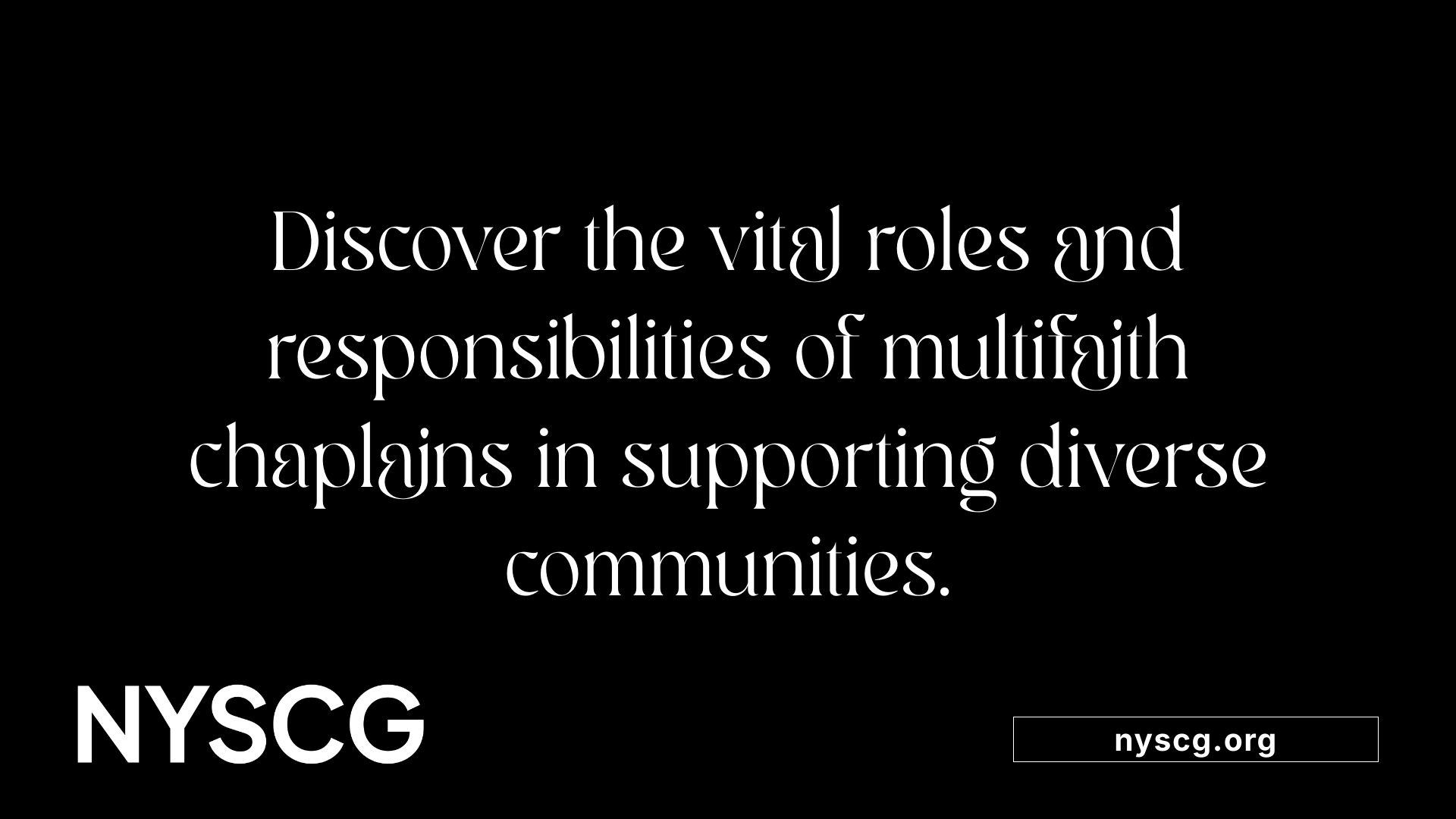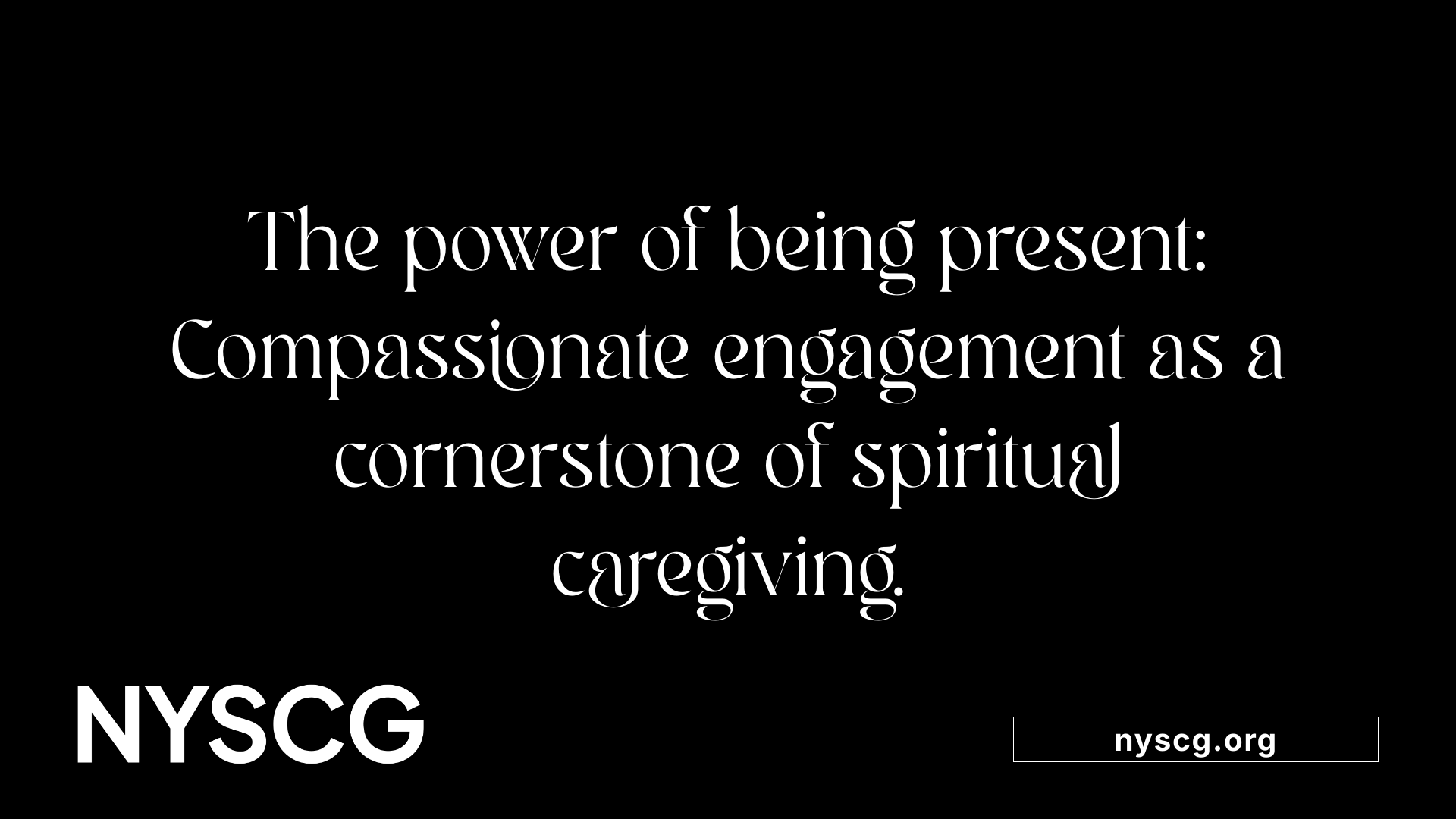Are Chaplains Allowed to Work Across Different Faiths?


Chaplains serve as essential spiritual caregivers across diverse settings such as hospitals, the military, prisons, and educational institutions. Their roles extend beyond religious boundaries, catering to individuals’ emotional and spiritual needs regardless of personal belief. As societies grow increasingly pluralistic, the question arises: are chaplains permitted and equipped to work across different faiths? This article explores the policies, roles, and ethical considerations guiding multifaith chaplaincy, shedding light on how chaplains navigate the complex terrain of religious diversity.

Chaplains serve as adaptable spiritual caregivers who operate across various settings, including hospitals, military facilities, prisons, and educational institutions. In multi-faith environments, their main duty is to provide emotional support, counseling, and guidance suited to individuals’ unique beliefs and backgrounds. They strive to uphold principles of respect and inclusivity, accommodating a wide range of religious traditions and secular perspectives.
These professionals often act as mediators or cultural brokers, bridging gaps between secular institutions and diverse spiritual communities. They are specially trained to handle complex emotional and spiritual challenges, such as grief, loss, and life changes, all while maintaining a non-judgmental stance.
A core aspect of their role involves fostering interfaith understanding and promoting religious pluralism. They work to create spiritual spaces that are flexible enough to support multiple faith practices or non-religious beliefs simultaneously. This approach encourages a sense of shared community and mutual respect among individuals of varied backgrounds.
Chaplains also focus on supporting individual resilience—helping people navigate difficult times with compassion and dignity. Whether through quiet presence, active listening, or providing specific spiritual rituals, they adapt their services to meet the needs of those they serve.
Overall, chaplains are dedicated to the well-being of individuals, offering a supportive presence that respects and celebrates diversity in belief and practice. Their work exemplifies a profound commitment to care that transcends religious boundaries, emphasizing empathy, humility, and cultural sensitivity.

Chaplaincy operates within a complex web of policies and regulations designed to ensure respectful and inclusive support for individuals of all faiths and beliefs. Major institutions such as universities, healthcare providers, and military organizations establish guidelines that promote ethical practice, confidentiality, and sensitivity.
For example, many universities like Goldsmiths University and Syracuse University have specific policies that guide chaplains in supporting a diverse student body. These regulations emphasize the importance of promoting interfaith dialogue, respecting individual spiritual identities, and avoiding proselytizing or imposing beliefs.
In healthcare settings, chaplains are trained to serve patients and families regardless of their religious background. Policies often specify that chaplains should maintain neutrality, support spiritual needs without judgment, and facilitate access to religious resources.
Military policies, guided in part by international agreements such as the Geneva Conventions, underline that chaplains are non-combatants, do not participate in hostilities, and serve as moral and spiritual advisors to service members of all faiths—including non-religious individuals.
Shared spaces and religious ceremonies usually require prior approval, ensuring that diverse beliefs are accommodated respectfully. Overall, these regulations aim to create a supportive environment where chaplains can function as bridges across different faiths and secular perspectives.
At the international level, organizations such as the International Interfaith or Faith Community organizations provide overarching principles promoting inclusivity and respect in multifaith chaplaincy. Many countries follow guidelines from their national governments or military standards, ensuring chaplaincy services align with broader human rights and religious freedom commitments.
For instance, the Geneva Conventions explicitly mention the protection and non-combatant status of chaplains, emphasizing their role in moral support and ethical advising. National military and correctional services typically develop detailed policies rooted in these international standards, tailored to their specific contexts.
In the United States, agencies like the Department of Veterans Affairs and the Department of Defense develop policies to ensure chaplains serve all service members equally, regardless of faith or no faith, and uphold the free exercise of religion.
Standards of practice emphasize that chaplains must demonstrate cultural competence, humility, and neutrality. They are expected to engage in mutual respect, active listening, and support tailored to individual needs.
Chaplains are trained to understand various religious traditions and secular beliefs to facilitate a non-judgmental environment. They should be able to translate between sacred and secular language, support interfaith understanding, and serve without proselytizing.
Most certifications and training programs set benchmarks that require chaplains to uphold these principles daily. They foster an environment where diverse beliefs coexist peacefully, and spiritual care is accessible and respectful for all.
| Policy/Guideline | Focus Area | Implementation Details | Source/Remarks |
|---|---|---|---|
| Ethical standards in chaplaincy | Respect, confidentiality, inclusivity | Training programs, codes of conduct, institutional policies | Goldsmiths University, Syracuse University |
| International human rights standards | Religious freedom, non-discrimination | Geneva Conventions, UN declarations | International standards, national military policies |
| Military chaplaincy policies | Service member support, neutrality | Non-combatant status, support for all faiths | Department of Defense, Veterans Affairs |
| Certification and practice standards | Cultural competence, language translation | Clinical Pastoral Education, board certifications | NACC, professional chaplaincy organizations |
Understanding these frameworks is essential for supporting a chaplaincy that upholds dignity, respect, and inclusiveness across diverse faith traditions and secular perspectives.

To become a professional chaplain, individuals typically need to meet specific educational and certification standards. Most employers require at least a graduate degree in theology, religious studies, pastoral care, or a related field. This academic background provides the foundation for understanding various religious traditions and spiritual practices.
In addition to formal education, aspiring chaplains must complete Clinical Pastoral Education (CPE), which involves four units of supervised practical training. This hands-on experience is crucial for developing skills in pastoral care, crisis intervention, and intercultural communication.
Professional recognition is often achieved through certification from organizations like the National Association of Catholic Chaplains (NACC) or similar bodies. Certification assures that chaplains have met rigorous standards for training, experience, and ethical practice.
Chaplains are trained extensively in religious literacy— the ability to understand and interpret various faith traditions and spiritual languages. This training equips them to translate between sacred and secular language, making spiritual care accessible in diverse environments.
Cultural competence is equally important. Chaplains learn to engage respectfully with individuals from different racial, ethnic, gender, and socio-economic backgrounds. This involves humility, mutual understanding, and the ability to serve across cultural differences.
Programs like those offered by the Chaplaincy Innovation Lab focus on fostering these skills, emphasizing mutual engagement, empathy, and humility. Their goal is to support chaplains in providing care that recognizes and respects each person’s unique spiritual and cultural identity.
Chaplains employ several approaches to meet varied spiritual requirements. Their work often involves non-judgmental listening, compassionate presence, and emotional support, regardless of explicit religious or spiritual topics.
Many chaplains focus on the ministry of presence—simply being with individuals in their moments of need without necessarily sharing their own beliefs. Christian chaplains, for example, may offer prayer, water, or quiet companionship as acts of care.
In multifaith settings, chaplains draw from their background and training to honor different beliefs. Some countries, such as Australia and the UK, employ non-faith-based or humanist chaplains who offer secular support. This inclusion broadens access and ensures that spiritual care is inclusive of those with no religious affiliation.
Chaplains are also skilled at translating spiritual concepts so they resonate within secular or diverse faith contexts. This flexibility allows them to serve effectively across a spectrum of religious and secular worldviews, always maintaining respect, empathy, and confidentiality.
| Aspect | Focus | Description |
|---|---|---|
| Education | Formal degrees | Graduate degrees in theology or related fields. |
| Certification | Professional recognition | Certifications from recognized organizations after CPE and experience. |
| Religious Literacy | Understanding diverse traditions | Ability to interpret sacred languages and practices. |
| Cultural Competence | Cross-cultural work | Engaging with people from varied backgrounds with humility and respect. |
| Practical Skills | Caregiving & confidentiality | Active listening, presence, and emotional support without judgment. |
This multifaceted training prepares chaplains to serve effectively in settings such as healthcare facilities, the military, prisons, and higher education — crucial for providing holistic, inclusive spiritual care.

Chaplains working across diverse, multi-faith settings adopt a range of strategies to ensure respectful and effective spiritual support. Fundamental to their approach is cultivating cultural competency—understanding and appreciating various religious and non-religious beliefs—and maintaining a pluralistic attitude that recognizes all spiritual paths as valid.
To foster connection and trust, chaplains utilize tools such as faith-specific and secular care cards, prayer cards, and artistic expressions. These instruments serve as bridges, allowing individuals to communicate their spiritual needs comfortably while offering chaplains avenues for respectful engagement.
Interfaith chaplains emphasize the importance of presence and active listening. They tailor rituals and practices to fit each person's unique context, often engaging in respectful dialogue and creative acts to deepen understanding. For example, using symbolic gestures or adaptable prayers helps connect with diverse individuals on a personal level.
Chaplains employ both universalist and particularist approaches. The universalist strategy involves non-denominational actions—such as providing comfort through compassionate presence—that transcend specific beliefs. Conversely, particularist techniques involve respecting and incorporating specific faith traditions when appropriate, ensuring individuals' spiritual identities are honored.
Institutional support plays a crucial role. Many organizations provide ongoing cultural competence training, emphasizing the importance of understanding different beliefs and practices. Additionally, chaplains pay close attention to contextual factors, such as the setting and individual preferences, to customize their care.
Through these methods, chaplains create an inclusive environment where individuals from all backgrounds feel seen, heard, and supported. Their ability to navigate complex spiritual landscapes relies heavily on humility, adaptability, and genuine engagement, ensuring that everyone receives care that respects their unique spiritual journey.
Multi-faith chaplaincy operates within a framework of strict institutional guidelines and ethical principles designed to respect religious diversity and uphold the dignity of all individuals served. These standards are rooted in the fundamental principles of neutrality, confidentiality, and cultural sensitivity.
Chaplains are expected to provide support free from proselytizing and coercion. They focus on listening and offering comfort that respects each person’s individual beliefs, whether religious or secular. This approach ensures that spiritual care is inclusive and non-discriminatory, fostering an environment of justice, compassion, and openness.
The professional codes guide chaplains to avoid conflicts of interest and to act with integrity and cultural competence. They must be aware of and sensitive to the diverse faith traditions and cultural values present in their communities. Maintaining professional boundaries while providing empathetic support is essential to uphold trust and respect.
In addition, chaplains are advised to act in a manner that promotes holistic well-being, supporting individuals regardless of their spiritual or non-spiritual identities. They must balance their own beliefs with the obligation to serve in a neutral and respectful manner. Ethical standards also require confidentiality, ensuring that personal disclosures are protected.
Overall, these guidelines aim to create a safe, welcoming space where individuals can explore or express their spirituality without fear of judgment or proselytizing. This environment enables chaplains to offer meaningful support while upholding the highest standards of ethical practice and cultural respect.
| Aspect | Focus | Description |
|---|---|---|
| Respect for Diversity | Religious, cultural, personal beliefs | Support is provided without bias, honoring each individual's identity |
| Non-proselytizing | Avoid imposing beliefs | Support through presence and empathy, not evangelism |
| Confidentiality | Privacy of conversations | Ensuring personal disclosures are protected |
| Cultural Competence | Understanding diverse backgrounds | Continuous learning to serve diverse populations effectively |
| Professional Boundaries | Personal and professional limits | Maintaining clear states of engagement and respect |
| Ethical Conduct | Integrity and respect | Actions guided by justice, compassion, and fairness |
This comprehensive approach ensures that multi-faith chaplaincy remains ethically sound and culturally respectful, fostering a supportive environment for all individuals through compassionate and neutral care.

The ministry of presence refers to the fundamental role of being with individuals in their times of need, offering support simply through one's presence, attentiveness, and compassionate communication. Unlike verbal evangelism or specific religious rituals, this approach emphasizes embodying empathy, humility, and genuine concern, embodying the belief that sometimes the most meaningful help is simply being there.
In diverse settings such as hospitals, military environments, or prisons, the ministry of presence serves as a bridge that facilitates trust and comfort. It embodies the idea that showing up and providing a non-judgmental space can significantly impact people's emotional and spiritual well-being, regardless of their specific faith or background.
Chaplains across many organizations—whether in healthcare, the military, or correctional facilities—use this principle to connect deeply with individuals. They listen attentively, offer quiet companionship, and demonstrate authentic care. This approach mirrors core aspects of cross-cultural religious literacy, such as humility and mutual engagement, fostering an environment where individuals feel respected and understood.
In the Christian tradition, the ministry of presence is closely linked to biblical models, such as Jesus meeting people where they are, exemplified in stories like that of Jesus and Peter. This Biblical narrative illustrates that God's way of being with us involves active presence, not just words.
Christian chaplains, guided by their faith and the Holy Spirit, harness this model to effectively serve others. They demonstrate God's love through consistent acts of kindness and attentive listening, regardless of whether they explicitly share their faith. This presence itself becomes a testament to divine love, offering hope and comfort especially in secular and multifaith settings.
In practical terms, this means that Christian chaplains focus on acts that uphold the dignity and worth of every individual. These acts include sitting quietly, offering water, praying silently, or simply listening without judgment. Such gestures often communicate God's care more powerfully than words alone.
The effectiveness of this approach relies heavily on understanding that the ministry of presence is not about proselytizing but about embodying love and compassion. It aligns with the broader goal of fostering spiritual and emotional resilience, demonstrating respect for diverse beliefs while embodying the Christian calling to serve.
In summary, the ministry of presence forms the heart of Christian chaplaincy and many other spiritual caregiving practices. It exemplifies God's way of being with us—meeting people where they are—and serves as a vital tool for providing compassionate care across various faith traditions and secular environments.
The landscape of chaplaincy today is characterized by its remarkable capacity to serve across religious and nonreligious boundaries. Through comprehensive training, ethical guidelines, and cultural competence, chaplains are uniquely equipped to navigate pluralistic environments with respect and sensitivity. Their roles—ranging from providing support and facilitating dialogue to embodying the ministry of presence—highlight the vital importance of inclusivity in spiritual care. As societies become more diverse, the ability of chaplains to work across faiths not only enriches individual experiences but also promotes mutual understanding and harmony. Ultimately, the practice of multifaith chaplaincy exemplifies a compassionate commitment to supporting holistic well-being for all, demonstrating that faith and empathy can indeed bridge divides.
All you need is the will to make the world a better place.
New York State chaplain group inc. is a tax deductible organization with a federal tax Id number 92-383-4921